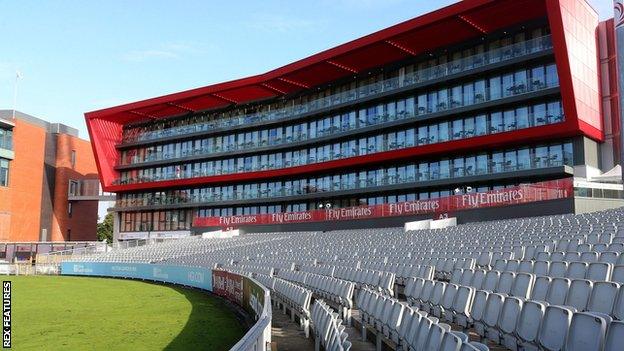Emirates Old Trafford could safely hold crowds of 'six or seven thousand', says Lancashire CEO
- Published

Old Trafford is hosting three international matches in July, including the second Test between England and West Indies
Test venues such as Old Trafford would be able to welcome crowds of "six or seven thousand" in a safe, distanced environment, says Lancashire chief executive Daniel Gidney.
England return with a behind-closed-doors three-Test series against the West Indies starting on 8 July.
But crowds are not expected at elite games until at least September.
"We can manage social distancing," Gidney told BBC Sport.
"I think it depends on if we get to one metre, one and a half or two metres [required distancing], but at the very least I think we could be looking at six or seven thousand [people] based on current guidelines, with quite a bit of room to manoeuvre."
The World Health Organisation recommends a one-metre gap between people, although many countries - including the UK - have greater distancing rules.
In addition, being outdoors, while still requiring distancing and safety protocols in place, is considered less of a risk than being in an enclosed space.
Old Trafford, with a 26,000 capacity and Test standard facilities, is well placed to cope with the required alterations.
"There are a number of things we can do," added Gidney. "There are one-way systems, we can put perspex coverings on food and beverage counters, and provide personal protective equipment for staff."
Gidney is confident Lancashire would have the infrastructure already in place to host a T20 game behind closed doors even under current safety guidelines.
While there is acceptance that public confidence needs to be built, there is also hope that the restrictions will be lifted, in time, to allow clubs to host spectators in a safe manner.
"If you are inside then a lot of it is about ventilation," continued Gidney. "People not being in close contact, not being opposite somebody else for more than 15 minutes.
"That's the very high risk element, but outside if people are sitting side to side and a bit away from each other that should be safe to do, but I do understand a lot of people's nervousness from previous major events.
"But I think we can do a 'slowly, slowly' approach and get small numbers of people back in on a reduced capacity basis."